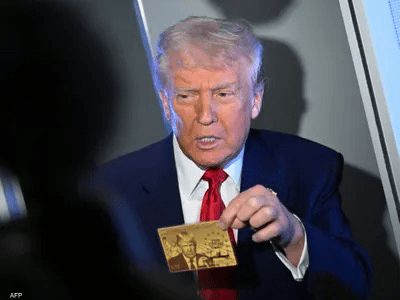
The plan aims to free up about $9 trillion of American retirement funds from the constraints of traditional stock and bond markets.
In a move that could radically change how the world's largest retirement market is managed, U.S. President Donald Trump is preparing to issue an executive order that would allow American retirement accounts (401(k) category) to invest in a broader range of non-traditional assets, including cryptocurrencies, gold, and private companies. According to the 'Financial Times'.
Trump's plan aims to free up approximately $9 trillion of American retirement funds from the constraints of traditional stock and bond markets and open the door for alternative assets such as cryptocurrencies, precious metals, special purpose acquisition companies, private loans, and infrastructure projects.
The executive order will require federal regulators, led by the Department of Labor, to study the remaining obstacles to including these alternative investments in professionally managed retirement accounts (401(k)), according to the newspaper. Currently, most of these plans invest exclusively in publicly traded and listed securities.
Cryptocurrencies to the forefront $TRUMP
Trump has long considered cryptocurrencies as one of the drivers of his victory in the 2024 presidential election, and he pledged during his campaign to 'free' this industry from regulations he deemed excessive. Since returning to the White House, he has already begun to roll back some restrictions imposed on cryptocurrencies, most notably the Department of Labor's decision last May to rescind a prior Biden administration directive that discouraged retirement plan officials from including cryptocurrencies as investment options.
Recently, the U.S. House of Representatives passed three bills supporting the stablecoin industry with direct backing from Trump. Meanwhile, the Trump family has expanded its investments in this sector through 'Trump Media & Technology Group', which purchased over $2 billion in digital currencies and launched a stablecoin and other digital assets.

What do you know about 401(k) accounts?
A 401(k) account is a partially tax-exempt retirement savings plan offered by employers to employees as a way to save a portion of their income for retirement. It allows them to allocate a portion of their income (before tax deductions) to invest in various funds, often in stocks and bonds.
Why is it named this way?
401(k) accounts are named after section 401(k) of the U.S. Internal Revenue Code.
How does it work?
The employee chooses a percentage of their salary to be automatically deducted and placed into the 401(k) account. This money is typically invested in mutual funds. Additionally, taxes on these amounts remain deferred until withdrawal at retirement.
Often, the employer may contribute an additional amount or a matching amount to what the employee contributes from their salary (such as adding 3% to the account if the employee contributes 3%, for example).
What are the contribution limits?
In 2025, the maximum annual contribution from the employee is $23,000, and those over the age of fifty can add an additional catch-up contribution of up to $7,500.
What happens when retiring?
Employees can start withdrawing money from their accounts starting at age 59 and a half without penalties. If the money is withdrawn before that, a 10% penalty is imposed in addition to the applicable taxes, with some exceptions like health disability or first-time home purchases.
What happens if the employee changes jobs?
They can 'roll over' their balance to their new employer's account or to an Individual Retirement Account (IRA), without losses or taxes, as long as the transfer is done correctly.
Who manages these accounts?
Major investment firms like 'Vanguard', 'BlackRock', and 'Fidelity' often manage these accounts in collaboration with the employer. Employees choose from a range of investment funds that vary in risk level and expected return.
And why is this system important?
Because it forms the backbone of retirement for tens of millions of Americans, especially as reliance on traditional pensions declines. 401(k) accounts give employees greater control over their financial future and an opportunity for their investments to grow over time.
#Tramp #BinanceSquareTalks #binancearabic #Write2Earn #BinanceExplorers
